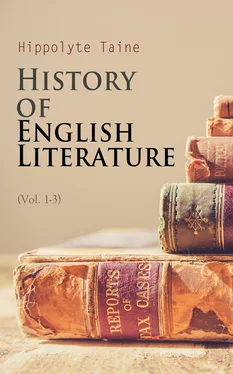"My father oft would speak
Your worth and virtue; and, as I did grow
More and more apprehensive, I did thirst
To see the man so prais'd; but yet all this
Was but a maiden longing, to be lost
As soon as found; till sitting in my window,
Printing my thoughts in lawn, I saw a god,
I thought (but it was you), enter our gates.
My blood flew out, and back again as fast,
As I had puff'd it forth and suck'd it in
Like breath: Then was I call'd away in haste
To entertain you. Never was a man,
Heav'd from a sheep-cote to a sceptre, rais'd
So high in thoughts as I: You left a kiss
Upon these lips then, which I mean to keep
From you forever. I did hear you talk,
Far above singing! After you were gone,
I grew acquainted with my heart, and search'd
What stirr'd it so: Alas! I found it love;
Yet far from lust; for could I but have liv'd
In presence of you, I had had my end." [490]
She had disguised herself as a page, [491]followed him, was his servant; what greater happiness for a woman than to serve on her knees the man she loves? She let him scold her, threaten her with death, wound her.
"Blest be that hand!
It meant me well. Again, for pity's sake!" [492]
Do what he will, nothing but words of tenderness and adoration can proceed from this heart, these wan lips. Moreover, she takes upon herself a crime of which he is accused, contradicts him when he asserts his guilt, is ready to die in his place. Still more, she is of use to him with the Princess Arethusa, whom he loves; she justifies her rival, brings about their marriage, and asks no other thanks but that she may serve them both. And strange to say, the princess is not jealous.
" Euphrasia. Never, Sir, will I Marry; it is a thing within my vow: But if I may have leave to serve the princess, To see the virtues of her lord and her, I shall have hope to live. Arethusa. ... Come, live with me; Live free as I do. She that loves my lord, Curst be the wife that hates her!" [493]
What notion of love have they in this country? Whence happens it that all selfishness, all vanity, all rancor, every little feeling, either personal or base, flees at its approach? How comes it that the soul is given up wholly, without hesitation, without reserve, and only dreams thenceforth of prostrating and annihilating itself, as in the presence of a god? Biancha, thinking Cesario ruined, offers herself to him as his wife; and learning that he is not so, gives him up straightway, without a murmur:
" Biancha. So dearly I respected both your fame And quality, that I would first have perish'd In my sick thoughts, than e'er have given consent To have undone your fortunes, by inviting A marriage with so mean a one as I am: I should have died sure, and no creature known The sickness that had kill'd me... Now since I know There is no difference 'twixt your birth and mine, Not much 'twixt our estates (if any be, The advantage is on my side) I come willingly To tender you the first-fruits of my heart, And am content t' accept you for my husband. Now when you are at the lowest.... Cesario. Why, Biancha, Report has cozen'd thee; I am not fallen From my expected honors or possessions, Tho' from the hope of birth-right. B. Are you not? Then I am lost again! I have a suit too; You'll grant it, if you be a good man.... Pray do not talk of aught what I have said t'ye.... ... Pity me; But never love me more!... I'll pray for you, That you may have a virtuous wife, a fair one; And when I'm dead... C. Fy, fy! B. Think on me sometimes, With mercy for this trespass! C. Let us kiss At parting, as at coming! B. This I have As a free dower to a virgin's grave, All goodness dwell with you!" [494]
Isabella, Brachiano's duchess, is defrayed, insulted by her faithless husband; to shield him from the vengeance of her family, she takes upon herself the blame of the rupture, purposely plays the shrew, and leaving him at peace with his courtesan, dies embracing his picture. Arethusa allows herself to be wounded by Philaster, stays the people who would hold back the murderer's arm, declares that he has done nothing, that it is not he, prays for him, loves him in spite of all, even to the end, as though all his acts were sacred, as if he had power of life and death over her. Ordella devotes herself, that the king, her husband, may have children; [495]she offers herself for a sacrifice, simply, without grand words, with her whole heart:
" Ordella. Let it be what it may then, what it dare, I have a mind will hazard it. Thierry. But, hark you; What may that woman merit, makes this blessing? O. Only her duty, sir. T. 'Tis terrible! O. 'Tis so much the more noble. T. 'Tis full of fearful shadows! O. So is sleep, sir, Or anything that's merely ours, and mortal; We were begotten gods else: but those fears, Feeling but once the fires of noble thoughts, Fly, like the shapes of clouds we form, to nothing. T. Suppose it death! O. I do. T. And endless parting With all we can call ours, with all our sweetness, With youth, strength, pleasure, people, time, nay reason! For in the silent grave, no conversation, No joyful tread of friends, no voice of lovers, No careful father's counsel, nothing's heard, Nor nothing is, but all oblivion, Dust and endless darkness: and dare you, woman, Desire this place? O. 'Tis of all sleeps the sweetest: Children begin it to us, strong men seek it, And kings from height of all their painted glories Fall, like spent exhalations, to this centre.... T. Then you can suffer? O. As willingly as say it. T. Martell, a wonder! Here is a woman that dares die.—Yet, tell me, Are you a wife? O. I am, sir. T. And have children?— She sighs and weeps! O. Oh, none, sir. T. Dare you venture For a poor barren praise you ne'er shall hear, To part with these sweet hopes? O. With all but Heaven." [496]
Is not this prodigious? Can you understand how one human being can thus be separated from herself, forget and lose herself in another? They do so lose themselves, as in an abyss. When they love in vain and without hope, neither reason nor life resist; they languish, grow mad, die like Ophelia. Aspasia, forlorn,
"Walks discontented, with her watry eyes
Bent on the earth. The unfrequented woods
Are her delight; and when she sees a bank
Stuck full of flowers, she with a sigh will tell
Her servants what a pretty place it were
To bury lovers in; and make her maids
Pluck 'em, and strew her over like a corse.
She carries with her an infectious grief,
That strikes all her beholders; she will sing
The mournful'st things that ever ear hath heard,
And sigh and sing again; and when the rest
Of our young ladies, in their wanton blood,
Tell mirthful tales in course, that fill the room
With laughter, she will with so sad a look
Читать дальше












